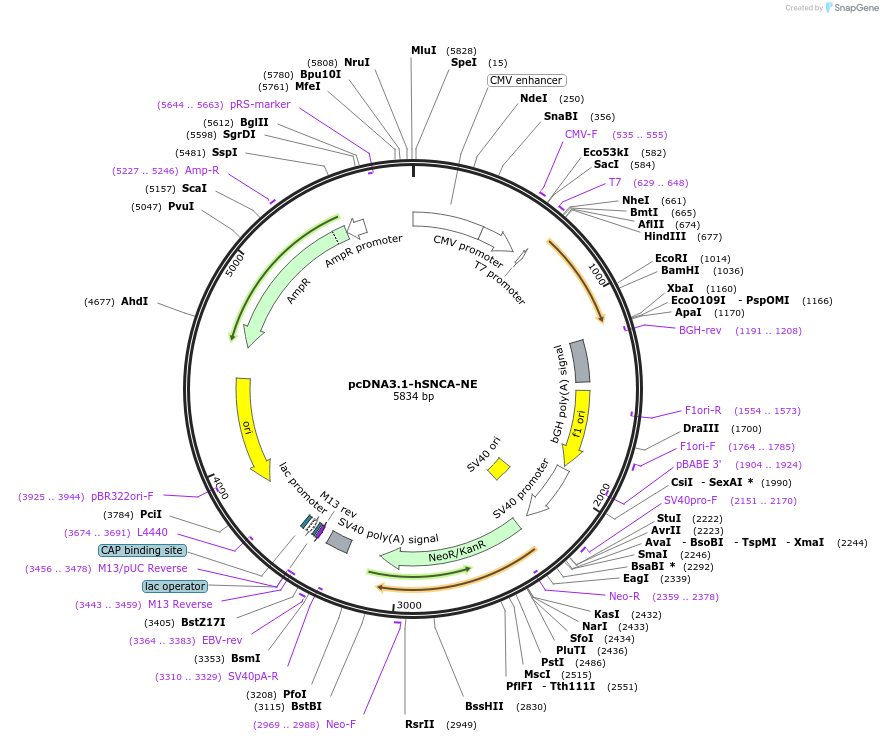-
PurposeOverexpression of synuclein alpha in mammalian cells
-
Depositing Lab
-
Sequence Information
Ordering
| Item | Catalog # | Description | Quantity | Price (USD) | |
|---|---|---|---|---|---|
| Plasmid | 102361 | Standard format: Plasmid sent in bacteria as agar stab | 1 | $89 | |
Backbone
-
Vector backbonepcDNA3.1(+)
-
Backbone manufacturerInvitrogen
- Backbone size w/o insert (bp) 5900
-
Vector typeMammalian Expression
-
Selectable markersNeomycin (select with G418)
Growth in Bacteria
-
Bacterial Resistance(s)Ampicillin, 100 μg/mL
-
Growth Temperature37°C
-
Growth Strain(s)DH5alpha
-
Copy numberHigh Copy
Gene/Insert
-
Gene/Insert namesynuclein alpha
-
Alt nameSNCA
-
Alt namePD1; NACP; PARK1; PARK4
-
SpeciesH. sapiens (human)
-
Insert Size (bp)477
-
Entrez GeneSNCA (a.k.a. NACP, PARK1, PARK4, PD1)
- Promoter CMV
-
Tag
/ Fusion Protein
- NE (C terminal on insert)
Cloning Information
- Cloning method Restriction Enzyme
- 5′ cloning site HindIII (unknown if destroyed)
- 3′ cloning site XbaI (unknown if destroyed)
- 5′ sequencing primer T7 primer/CMV-F primer
- 3′ sequencing primer BGH-R
- (Common Sequencing Primers)
Terms and Licenses
-
Academic/Nonprofit Terms
-
Industry Terms
- Not Available to Industry
Trademarks:
- Zeocin® is an InvivoGen trademark.
Depositor Comments
This plasmid encodes a novel 18-amino-acid protein tag - "NE", which can be detected by a specific mouse monoclonal antibody in Western blotting, immunopreciptation, and immunocytochemistry. (Source of antibody: http://www.versitech.hku.hk/reagents/ne/)
These plasmids were created by your colleagues. Please acknowledge the Principal Investigator, cite the article in which the plasmids were described, and include Addgene in the Materials and Methods of your future publications.
-
For your Materials & Methods section:
pcDNA3.1-hSNCA-NE was a gift from Shu Leong Ho (Addgene plasmid # 102361 ; http://n2t.net/addgene:102361 ; RRID:Addgene_102361) -
For your References section:
Age-dependent accumulation of oligomeric SNCA/alpha-synuclein from impaired degradation in mutant LRRK2 knockin mouse model of Parkinson disease: role for therapeutic activation of chaperone-mediated autophagy (CMA). Ho PW, Leung CT, Liu H, Pang SY, Lam CS, Xian J, Li L, Kung MH, Ramsden DB, Ho SL. Autophagy. 2019 Apr 14:1-24. doi: 10.1080/15548627.2019.1603545. 10.1080/15548627.2019.1603545 PubMed 30983487



